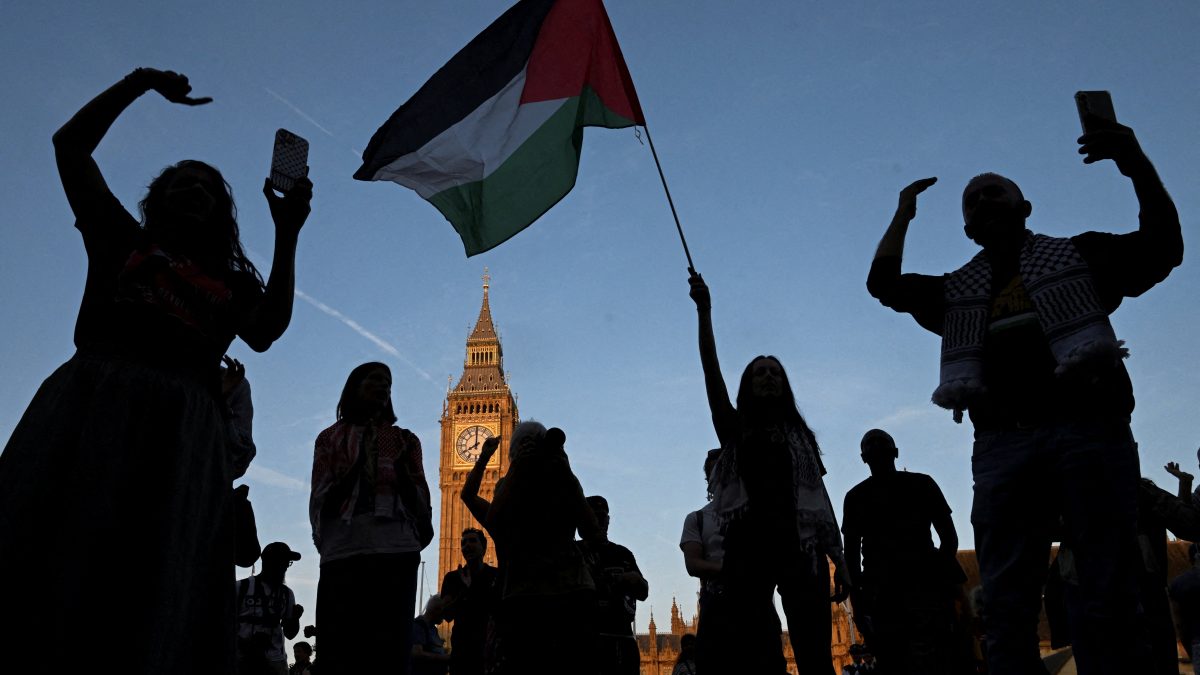Former Palestinian peace negotiator, Yezid Sayigh, said that the recognition of a Palestinian state by Western nations was ’too little, too late’ as he maintained that the window for a two-state solution closed over two decades ago when the West abdicated from its responsibilities towards Israel and Palestine.
Ahead of this year, the United Nations General Assembly (UNGA), countries like the UK, France, Canada, Portugal, etc, recognised the state of Palestine, raising concerns over the humanitarian crisis in Gaza. However, Sayigh, Senior Fellow, Malcolm H. Kerr Carnegie Middle East Centre, told Firstpost that such endeavours should have been taken way before the Israel-Hamas war commenced.
“I think that recognition of the state of Palestine by these Western countries is too little, too late. Countries Italy and Germany, for instance, endorsed, officially, unequivocally, the Palestinian right to national self-determination, including in the form of a state without veto, as far back as 1999, and the US endorsed this at the United Nations Security Council as well in 2001. So, of course, this is too late,” Sayigh told Firstpost.
“It’s also too little, so long as all we get is symbolic recognition that is not then followed up by further steps. And these steps, very simply, are firstly to move to the next stage, which is to work on admitting the state of Palestine that has been recognised by a majority of the world’s countries as a full member of the United Nations. Now, I think you and I both understand that the United States will veto such a move immediately.”
“But I think the next step nonetheless remains for these Western countries that recognised the state of Palestine, two of them, hold a veto power in the Security Council itself and are permanent members (France and the UK), they should be working now in collaboration with Arab countries such as Saudi Arabia, Egypt and others, to push the issue within the United Nations General Assembly to create a massive political campaign behind the admission of state of Palestine to the UN.”
What should be the next step?
Sayigh emphasised that the Palestinian state’s inclusion in the United Nations empowers the region to call on the UN to fulfil its charter promise to protect a state that is “under hostile or belligerent military occupation and subject to other kinds of attacks and restrictions. This is why, of course”. However, he maintained that the “ United States would not allow this, nonetheless.”
The Palestinian historian emphasised how individual governments or groups of governments, such as the European Union, have several means at their disposal to take concrete means at their disposal to “show Israel that they cannot have it both ways,” i.e., “unleashing settler violence and atrocities in the West Bank and Gaza, and still have massive access to the European markets.
“All of these measures have been mentioned, by the way, just in the past month or so by the European Commission Commissioner Ursula von der Leyen. So I’m not sort of pursuing or proposing a radical agenda. This is something that a highly conservative political figure in the European Union has put on the table as something that the European Union is now forced to look at,” Sayigh averred.
“There clearly has to be a continued effort in these directions, because if the Europeans, among others, including let’s say, the Government of India, the Kingdom of Saudi Arabia, all these important countries, if they just sit back and say, well, we now have a plan from US President Trump, it won’t work. Let’s all make it work. They have to exert maximum political pressure to make sure that the US president stays on focus, doesn’t bend every time Netanyahu makes new demands.”
2-state solution window closed a long time back
When asked about the evolution of the conflict from the 1990s to the present, Sayigh explained that the conflict is “at a very different place today” than where it was in the 1990s. He recalled the six-year peace period following the signing of the Oslo Accords between the Palestine Liberation Organisation and the then-government of Israel. He noted that within that period, there was a possibility to deepen political understanding and reconciliation between the two sides.
“There was, I think, a meaningful Israeli peace camp, and there was also, of course, definitely a Palestinian peace camp, which was represented in its own leadership. Both sides made various mistakes during that period. I think the Israelis made very serious mistakes by continuing with the colonisation of the West Bank and East Jerusalem basically every single day during those fairly promising years of the 1990s,” he told Firstpost.
He recalled that by the end of six years, Palestinian social and economic conditions for a large part of the population were deteriorating due to Israel’s collective punishment and blockade on Trade, which prevented both Palestinian territories from growing.
He also mentioned that the 2000 Camp David Accords were brokered by then-US President Bill Clinton between Israeli Prime Minister Barak and PLO leader Yasser Arafat, disregarding the homework that was done before, a reform process in which even Sayigh was involved.
“I think this prompted the breakdown of trust and the start of Palestinian violence in October 2000, to which the Israeli army had already decided from some years before to respond with extreme violence as well. And that combination of violent behaviour from both sides from October 2000 onwards, in my view, at that time, and I put this in writing at that time, closed the window for the two-state solution,” Sayigh said.
“So for me, in a way, what we have been living in the last two years is something that we saw coming, I saw coming 25 years ago, not in detail, but the two-state solution was already over as of the end of the year 2000. Why we’re here today in the cycle of violence, I think, goes back to both the failures of the Palestinian-Israeli leadership during the good years of the peace process until 2000.”
How the West is also to blame
The Palestinian historian also maintained that the abdication of the Western governments from the conflict has also led to the cycle of violence persisting in the region. “Today’s violence also, I think, is the result very directly, frankly, of the abdication by the Western governments, in particular those of the European Union, and of the US administration to maintain a meaningful process to curb Israeli violations that were occurring already in the 1990s in terms of colonising territory, squeezing the economy, strangulating it, and so on,” he said.
“And finally, on this point, the European Union in 1999 unanimously endorsed Palestinian rights to self-determination in the form of a state not subject to conditions or veto of any power, and committed to adopt a new approach towards recognising statehood. That was 26 years ago.”
“US President George W. Bush, in 2001, was the first leader to seek and sponsor a statement from the United Nations Security Council committing the United Nations to seeking Palestinian statehood. This was 24 years ago. Since then, neither the US nor the Europeans, including, in this case, of course, the United Kingdom, since it left the EU, did any heavy lifting to make sure that they were committed to their own declared goals,” he added.
End of Article

)

